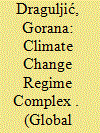| Srl | Item |
| 1 |
ID:
169413


|
|
|
|
|
| Summary/Abstract |
In an era defined by forum shopping, institutional proliferation, and regime complexity, why do global governance arrangements remain relatively stable? This article combines the insights of regime complexity scholarship with historical institutionalism to address this question. It argues that the establishment of international regimes creates winners and losers. States dissatisfied with these arrangements push for institutional change. Regimes nonetheless tend to develop in a path-dependent manner because institutions are resistant to change and the winners under the status quo seek to protect it. Thus, existing governance arrangements exert a centripetal pull, even when states engage in forum shopping and institutional proliferation to generate regime complexity. An examination of path-dependent institutional development in the global climate regime supports the argument.
|
|
|
|
|
|
|
|
|
|
|
|
|
|
|
|
| 2 |
ID:
175522


|
|
|
|
|
| Summary/Abstract |
This paper examines the influence of developing countries during the construction of international institutions that govern the global commons. It argues that developing states are empowered by the problem structure of commons issues because the latter’s management requires universal participation. This allows developing states to employ their large numbers to shape institutional outcomes in two ways. First, they can leverage non-participation when the need for commons management arises, threatening the long-term viability of a valued good unless their demands are met. Second, developing states can utilise their majority status in the international venues through which commons issues are addressed to advance their preferred policies. A case study on the Third United Nations Convention on the Law of the Sea, followed by brief comparisons to the creation of the focal institutions for ozone and climate governance, illustrate the argument.
|
|
|
|
|
|
|
|
|
|
|
|
|
|
|
|